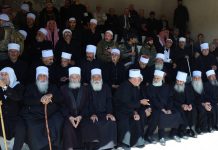The NYT reports how ethinic Bengali Muslims face discrimination in India, Myanmark and even Bangladesh. Over four million residents of the Indian state of Assam were stripped of their citizenship after their names were rejected from the National Register of Citizens. The government claims to have launched the project to identify illegal immigrants emanating from neighbouring Bangladesh, but it has heightened fears of a “witch hunt” against Bengali Muslim.
- Indian Military Base in Sabang can Strangle China at the Strait of Malacca
- Saudi Money, US Weapons, Israeli Intelligence Fuelling Arab NATO – Iran
Bangladeshi’s or Indian Bengali Muslims?
Assam lies in the northeast of India, bordering Bangladesh. As part of a complicated bureaucratic project, about 32.9 million people and 65 million documents were scrutinized over five years at a cost of $178 million to determine the citizens of Assam citizens. The officials administering the National Register of Citizens accepted 28.9 million claims to Indian citizenship while rejecting nearly four million.
The intention of such screening to ascertain nationality goes back to the aftermath of the 1947 Partition of British India into India and Pakistan. A register of citizens set up in Assam in 1951 was never completely realised. 24 years after the Partition, the mostly Bengali Eastern Pakistan seceded from West Pakistan with Indian army help, and a new country, Bangladesh was formed on March 24, 1971. The dreadful war that followed the formation of Bangladesh had sent millions of refugees into the neighbouring Indian states of Assam and West Bengal.
Politics over illegal immigration from Bangladesh into Assam has been a dominant force in the politics of the state for decades. In 2008, an Assam-based NGO approached the Supreme Court of India claiming that 4.1 million illegal foreigners had been designated as voters in the state. In 2014, the Supreme Court ordered the federal government to renew the National Register of Citizens.
The renewed list defines as Indian citizens the residents of Assam who were present in the state before March 25, 1971, and their direct descendants. The N.R.C. asked for certain legal documents to be presented as proof of nationality — including the voter lists for all Indian elections up to 1971.
People born after 1971 could furnish documents that link them to parents or grandparents who held the original documents. So each person going through the process had to show a link to a name on the 1951 register and the only two voter lists — those of 1965-66 and 1970-71 — that were ever made public. Such criteria, applied across India, left a good percentage of its citizens stateless.
The Supreme Court, which had ordered the process of National Register of Citizens, has now directed that no action should be launched against those left out and that a procedure should be set up for dealing with appeals and grievances. A definitive list is expected at the end of an appeal process. So far six overcrowded jails doubling as detention centers in Assam house 1,000 “foreigners,” and the Indian government has permitted to build a new detention center.




